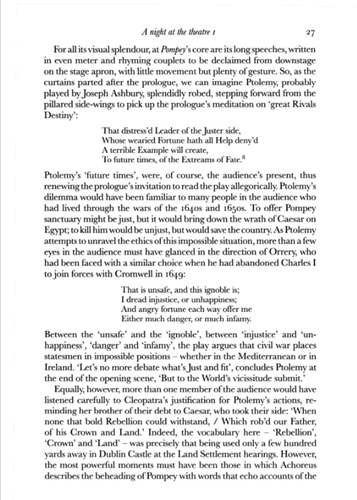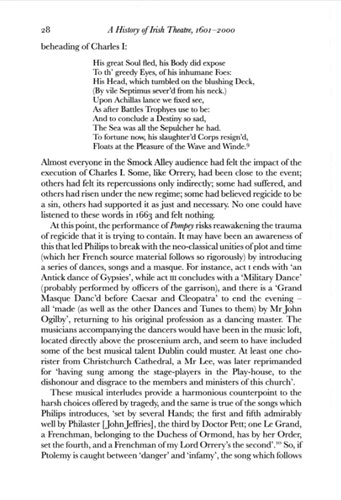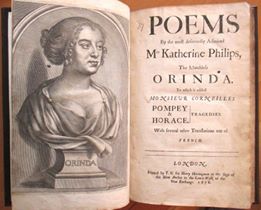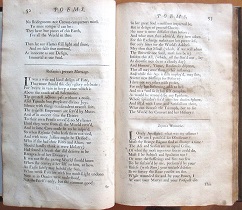       |
Life
| 1631-1664 [self-styled “The Matchless Orinda”]; one of the founders of the heroic verse drama in English - with Roger Boyle (afterwards Earl of Orrery; q.v.]; Lord Orrery, who strenuously promoted her work in Dublin; she formed the Society of Friendship, involving Jeremy Taylor and others incl. notably Sir Edward Dering, president of the Irish Court of Claims at the Restoration; her Pompey, a rhymed tragedy after Corneille, was the first in long succession of French plays in translation played ‘great acclaim’ in at the Royal Th., Dublin (Smock Alley, 10 Feb. 1663); |
| the piece was played with an elaborate entr’acte involving costumes and scenery of ancient Rome and Egypt; the prologue was by Roscommon, and the epilogue by Dering - then adminstrator in charge of land claims in Ireland at the Restoration; the play was printed Dublin and in London, where it sold out; the fifth act of her version of Corneille’s Horace was supplied by Sir John Denham in 1668; her familiar letters render her a diarist of Restoration Dublin; her husband remained in Wales while she nurtured his hopes of a land-grant in Ireland. GBI OCEL ODNB OCIL |
[ top ]
Works
|
| Miscellaneous |
|
| Attributed |
|
| Selections |
|
| Microfilm |
|
|
||||
[ top ]
Bibliographical details
Poems / by the most deservedly admired Mrs. Katherine Philips, the matchless Orinda. To which is added Monsieur Corneille’s tragedies of Pompey and Horace, with several other translations out of French (London: Printed for Jacob Tonson 1710), [46], 562pp., [1] lf. pl., port., 8o [20 cm] [being verse eulogies by Abraham Cowley, the Earls of Orrery and Roscommmon, and others; in which the Act V of “Horace” is translated by Sir John Denham].The Collected Works of Katherine Philips: The Matchless Orinda, 3 vols. (Walden Road: Stump Cross 1990-93). CONTENTS: Vol. 1. The Poems, ed. with notes and commentary by Patrick Thomas, xiv, 417pp.; Vol 2: The Letters, with notes and commentary by Patrick Thomas, xviii, 220p.; Vol. 3: The Translations, ed. with textual notes and commentary by Germaine Greer and R. Little, xxi,266p.]
[ top ]
Criticism
|
|
[ top ]
Commentary| Edmund Gosse, The Matchless Orinda, in Seventeenth-Century Studies (London 1883) [first publ. in The Cornhill Magazine, Vol. 44, Iss. 262 (Oct. 1881), 407-420 [available at ProQuest - online]. |
|
| —Available in a copy from The Cornhill Magazine (Oct. 1881) - at QuestPro online; accessed 01.06.2023.] |
William Smith Clark, the Early Irish Stage: The Beginnings to 1720 (Oxford: Clarendon 1955). ‘Few in that large and brillieant audience presided over by the Lord-Lieutenant realised that once again … Dublin had taken the lead over Lodnon in an historic stage production. Pompey marked the frist in a long succession of Restoration performances of French plays in English.’ (p.5; cited in Michael Cronin, Translating Ireland: Tranlsations, Languages, Cultures, Cork UP 1996, p.68.)
W. B. Stanford, Ireland and the Classical Tradition (IAP 1976; 1984), Katherine Philips ... encouraged in her work [Pompey, 1663] by Roger Boyle (Lord Broghill, afterwards Earl of Orrery) who lent £100 for purchase of Roman and Egyptian costumes (p.91.)
Christopher Morash, ‘A Night at the Theatre I: Pompey by Katherine Philips ... Tuesday, 10 February 1663’, in A History of Irish Theatre 1601-2000 (Cambridge UP 2002), pp.21-29: Morash gives a brilliant account of Philip’s Pompey as a production directed at reconciling the royalist and parliamentary forces engaged in the Irish civil war, and subsequently at loggerheads during the arbitrations of the Court of Claims relating to the repossession of estates formerly belonging to royalists, or the endorsement of the titles of their Cromwellian successors. [See sample pages at Cambridge Univ. Press - via Google Books online, or view photo-copies as attached.].
 |
 |
| Morash, History of Irish Theatre, 1601-2000 (Cambridge UP 2002), pp.27-28; see further as attached.. | |
Ellen Moody, ‘Orinda, Rosania, Lucasia et aliae: Towards a New Edition of the Works of Katherine Philips’, in Philological Quarterly, 66 (1987), pp.325-54 - remarks prefatorily to online edition of the article: ‘I put this essay on the Net to make the information and texts contained in it readily available. I also note that in Thomas’s edition for Stump Cross Press, Thomas simply edited the manuscript and followed the order we find in Cotterell. Thus his edition leaves Katherine Philips’s poetry with the same skewed emphasis and disorder that Saintsbury’s reprint of Cotterell left it. Thomas substitutes a much better text than Saintsbury’s or Cotterell’s; he prefaces the texts with a description of the manuscripts and other printed books where the poems may be found; he includes informative notes; but without a comprehensible order, the poetry remains opaque to a reader who is not impeccably versed in her life history. There are other contemporary arrangements which he could have followed; for example, one found in manuscript 775b in the National Library of Wales, and printed in Carol Barash’s English Women’s Poetry, 1649-1714 (Oxford: Clarendon Press, 1996), 291-98. Speaking generally, in this manuscript the private autobiographical poems come first, with the moral poems coming in gradually. The political poems are sandwiched in before the very end where the moral/religious predominate over the personal/autobiographical poems. / I also reprint (Thomas does not) Katherine’s translation of a pastoral “Golden Age” poem, “La Solitude” by Antoine Girard Saint-Amant (1594-1661) as “Solitude” [...]’. (Accessed online; 21.12.2009].
Katherine Duncan-Jones, review of Stump Cross edition of her works (3rd vol.) in Times Literary Supplement (1 April 1994), is stern; unnamed editors criticised for admitting that they have not seen the 1993 article in Manuscript Studies by E. H. Hageman and A Sununu on ‘New Manuscript Texts of Katherine Philips’.
Carol Rumens, review of Germaine Greer, Slip-Shod Sibyls (Penguin 1995), remarks on Philips’s ‘clumsy uncertainties’ illustrating Orinda’s practice in two lines (‘I know I gain another diadem / For which none can be blamed but her and him’), on which she sought advice from Poliarchus regarding the pronoun ‘him’, having been told by another critic that it was ‘scarce grammar’. (Times Literary Supplement, 13 Oct. 1995, p.29).
Germaine Greer: Greer’s Slip-Shod Sibyls (Penguin 1995) is noticed in The Irish Times (28 Sept. 1996) by Brian Fallon remarking that Katharine Philips [sic] is the treated as ‘a major writer of the Restoration period’. Note also that Greer is a contributor to the third vol. of Patrick Thomas’s edn. [listed in Works, supra]
[ top ]
| ‘On the Welsh Language’ |
|
| See Poetry Foundation > Katherine Philips - online. |
Notes
Sir John Gilbert: Gilbert’s account of Smock Alley (History of the City of Dublin,) begins with ‘Orinda’; Dublin records show that a Mr Lee, chorister of Christ Church Cathedral, was reprimanded for singing in it; it is not clear whether Philips’s or Sir Edmund Waller’s Pompey was the more popular version (in 1678); Lady Anne Dungannon was ‘the excellent Lucasia’, and Lady Anne Boyle, ‘the adored Valeria’; John Keats copied a poem of Katherine Philips in a letter to John Reynolds (Sept. 1817), ascribing to it ‘the most delicate fancy of the Fletcher kind’. (See Fidelis Morgan, Female Wits, 1979, Chap I.)
[ top ]

